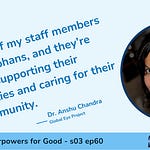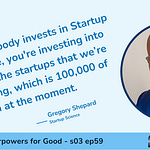Devin: What is your superpower?
Mark: I don't know if I have one, but I would say it's what we just talked about; it's a focus on return investment when applied to giving that I execute on.
Mark Gerson is the husband of Rabbi Erica Gerson and is devout in their shared Jewish faith. They are raising their four children in that model; they attend Jewish day school. It is notable, therefore, that he helped found, chairs and is the chief funder for a Christian nonprofit, African Mission Healthcare. It has everything to do with his superpower, focusing on ROI.
In 2000, Mark’s closest friend from college, John Fielder, called to say he’d graduated from medical school at John’s Hopkins and had decided that rather than serve as the 700,000th MD in the United States, he’d go to Africa to treat the millions of people who have AIDS. He explained the decision as being a product of his Christian faith.
The “greatest humanitarian problem in the world is the lack of access to care for almost everybody in Africa,” Mark explains, noting that he learned this from John. Mark credits John for inspiring the formation of African Mission Healthcare. Across Sub-Saharan Africa, there is just one doctor for every 10 to 50,000 people. In the U.S., by comparison, there is 1 doctor for every 339 people.
Rabbi Erica, Mark says, had four c-sections to deliver their children. In New York, where they live, if you need a c-section, you get a c-section. In Africa, there is an 80 percent chance that you can’t get the c-section you need. Women who survive, often have fistulas between their vaginas and bowels, resulting in a devastating cascade of health and social problems.
African Mission Healthcare focuses on three areas of activity, supporting Christian-owned and operated hospitals in Africa: clinical care, infrastructure and training.
Mark says that the Christian missionaries he funds are not doing much proselytizing. One an early visit, he spent two days with Dr. Mark Jaconbsen shadowing his work, during which time he didn’t try to convert anyone. When Mark asked the doctor about it, he said, they only have those conversations in the rare situation when a patient asks, “Why do you care so much that you are here instead of working back home in the United States?”
Even then, Mark says, they don’t always get a chance to do it. Visiting a clinic with a rotating surgeon on-site, the surgeon had a queue of people that would require 10 hours of visits, not leaving much time for religion. Christian doctors are playing a vital role in Africa that is more about care than conversion.
“The Torah tells us thirty-six times—more than anything else—that we are to ‘love the stranger,’” Mark explains. “So as serious Jews, we have to say, ‘Well, how can we discharge that biblical obligation to love the stranger? And when we ask that question, it's answered by Christian missionary doctors.”
For many years, missionary doctors were supported by their churches. Many denominations have dwindled over recent decades, along with the donations they provided. Mark is stepping in to fill some of that void. He recently committed $18 million.
At the moment, Mark, Erica and UBS are matching donations to African Mission Healthcare.
How to Develop a Focus on ROI As a Superpower
Mark encourages all philanthropists, including those making donations of $100, to apply the same sort of scrutiny to giving that they do to investing. When making an investment, experienced investors consider the return on investment or ROI.
Circling back to the c-sections, Mark notes that the cost ranges from $232 to just under $500 from country to country in Africa, but the impact is huge. When you save a life, he notes, you never save just one. There are always ripples, especially when treating mothers.
What is now the Waldorf Astoria in New York City was once the New York Fistula Hospital. It isn’t anymore simply because women in New York who need a c-section, get one, thus avoiding complications like fistulas.
While Mark notes that “good feelings derive from facts,” he is quite analytical. He introduced me to a well-understood public health concept known as DALY’s, that is, disability-adjusted life years. It is a calculation of the years of life lost due to death or disability. One DALY represents the loss of the equivalent of one year of full health, according to the WHO.
For a philanthropist, the ROI calculation is different than for an investor measuring a purely financial return. “We try to missionize, we try to evangelize” the idea of measuring ROI for philanthropy. Measuring leads to putting money to work where it will do the most good.
By deliberately checking the impact of your giving, you can make a focus on ROI a philanthropic superpower of your own.














